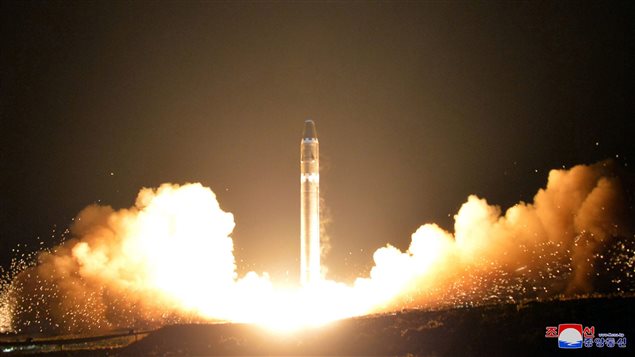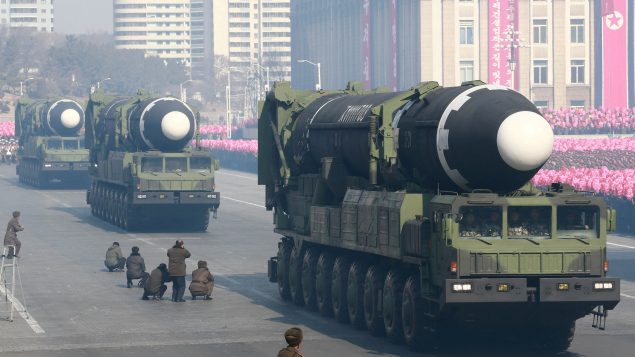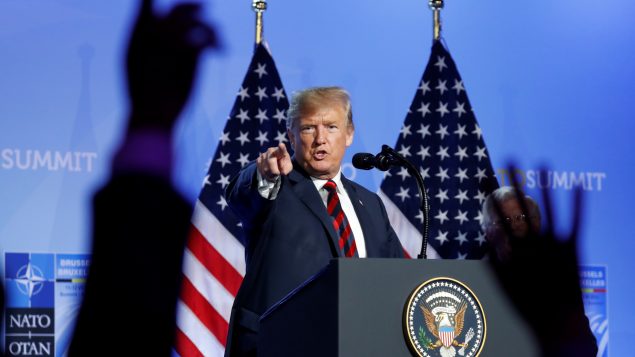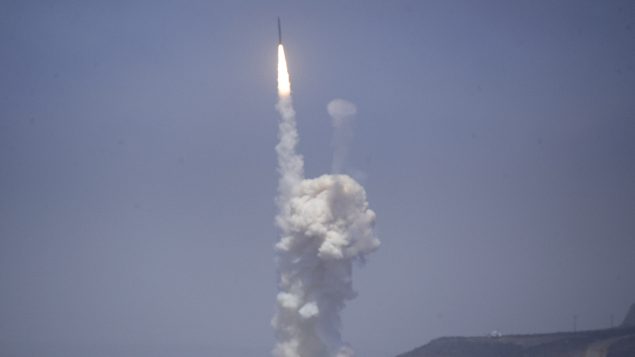Despite recent diplomatic overtures between Washington and Pyongyang over North Korea’s nuclear and missile programs, the overwhelming majority of Canadian defence and security experts would like to see Canada join the U.S. continental ballistic missile defence system, says a recently released survey.
The survey by the Macdonald-Laurier Institute, titled Should Canada Participate in Ballistic Missile Defence?, revealed an important expert consensus among 49 Canadian defence experts, academics, former diplomats and military officials, said report author Jeffrey Collins.
“An overwhelming opinion of 90 per cent (of respondents) is that Canada should look at being involved in ballistic missile defence because of heightened threat that has been coming from North Korea,” said Collins, a fellow at the Canadian Global Affairs Institute.
(click to listen to the interview with Jeffrey Collins)
ListenCanada is not protected by U.S. missile defence

This Wednesday, Nov. 29, 2017, image provided by the North Korean government on Thursday, Nov. 30, 2017, shows what the North Korean government calls the Hwasong-15 intercontinental ballistic missile, at an undisclosed location in North Korea.
(Korean Central News Agency/Korea News Service via AP)
Collins said many Canadian experts were stunned when in September of last year when Lt.-Gen. Pierre St-Amand, the Canadian deputy commander of the binational North American Aerospace Defence Command (NORAD) at the time, told Canadian MPs that under the current U.S. policy, the American military would not protect its northern neighbour from a ballistic missile attack launched by North Korea or another rogue regime.
- Should Canada join U.S. ballistic missile defence program?
- U.S. has no obligation to protect Canada from North Korean ballistic missile attack, MPs told
St-Amand said because Canada is not part of the U.S. ballistic missile defence (BMD) program, Canadian military personnel posted to NORAD would have no role in deciding what to do if a ballistic missile from North Korea or any other country was detected heading toward North America.
They would instead be passive observers, waiting to see whether U.S. officials would in fact decide to shoot down a missile or missiles heading toward Canada.
Collins said the majority of Canadian experts agreed that in order for Canada to get under the U.S. ballistic missile defence umbrella Ottawa had to become part of the system.
“Canada is in a bit of an interesting situation even amongst NATO allies,” Collins said. “NATO has officially adopted ballistic missile defence as a policy and actually has deployed in Poland – and soon in Romania – ground-based missile interceptors. So Canada technically supports that but on our own continent we have not adopted that position.”
Change in geopolitical realities

Intercontinental ballistic missiles are seen at a grand military parade celebrating the 70th founding anniversary of the Korean People’s Army at the Kim Il Sung Square in Pyongyang, in this photo released by North Korea’s Korean Central News Agency (KCNA) February 9, 2018. (KCNA/via REUTERS)
The issue of Canadian participation in the U.S. ballistic missile program was initially raised in 2004 and 2005 during the Paul Martin government.
However, several external and domestic factors, such as political sensitivity of the issue, especially in Quebec, where there was a lot of opposition to any Canadian participation in the BMD program, uncertainty over the threat itself and questions over reliability of the technology and the cost of Canadian participation, meant that Ottawa decided to decline Washington’s invitation, Collins said.
However, now the larger geopolitical realities have changed, Collins said.
“North Korea now actually does have the missile technology and they actually do have nuclear weapons, and there still remains a question mark, particularly after the meeting with President Trump, the North Koreans have given no indication that they’re going to abandon nuclear weapons,” Collins said.
Despite strong opposition from Moscow and Beijing, the missile defence system is not aimed at Russia or China, he said.
“It’s a limited capability aimed at deterring ‘rogue states’, countries like North Korea and Iran,” Collins said. “And of course, Iran again, thanks to the actions of the Trump administration, has put a question mark whether the agreement that was reached in later Obama years will still hold in terms of constraining the Iranian ambitions and their missile technology.”
Assuaging Trump

U.S. President Donald Trump takes questions from the media during a news conference after participating in the NATO Summit in Brussels, Belgium July 12, 2018. (Kevin Lamarque/REUTERS)
The other reason for joining the U.S. missile defence umbrella is to have a seat at the table, he said.
Experts have suggested various scenarios of Canada’s participation in the U.S. missile defence system such as outfitting Canada’s future generation of surface combatant ships that will come to replace the Royal Canadian Navy’s current fleet of frigates with missile defence systems, like the Aegis system.
Another suggestion that would cost even less is upgrading the Northern Warning System across northern Canada built in the mid-1980s to replace the DEW (Distant Early Warning) Line, Collins said.
Canada could offer to assume most of the costs of the upcoming upgrade as a way to participate in the BMD, he said.
With President Trump increasingly perceiving alliances as transactional, Canada stands to gain some significant capital by formally cooperating with the U.S. on BMD, Collins said.
Participation in BMD could assuage the Trump administration’s growing concerns over Canada’s modest defence spending, while satisfying Canada’s own security needs and interests, Collins added.







For reasons beyond our control, and for an undetermined period of time, our comment section is now closed. However, our social networks remain open to your contributions.